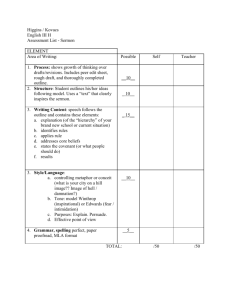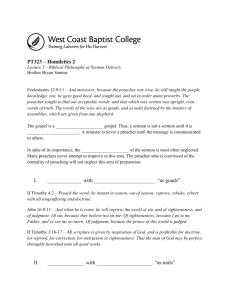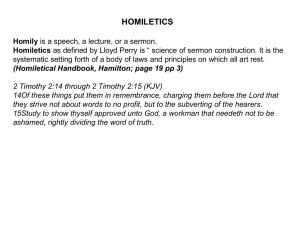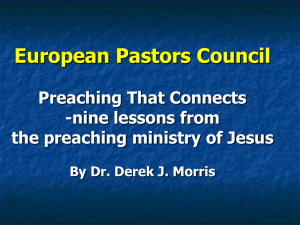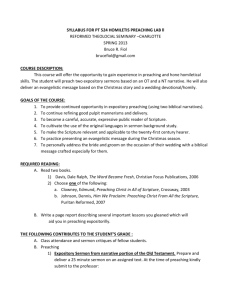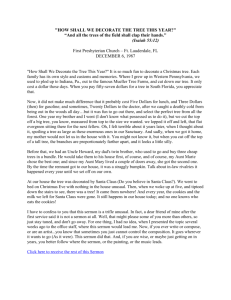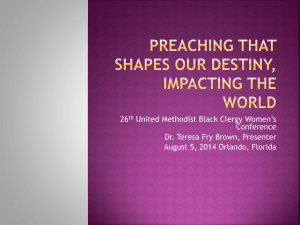PC447 - Brisbane School of Theology
advertisement
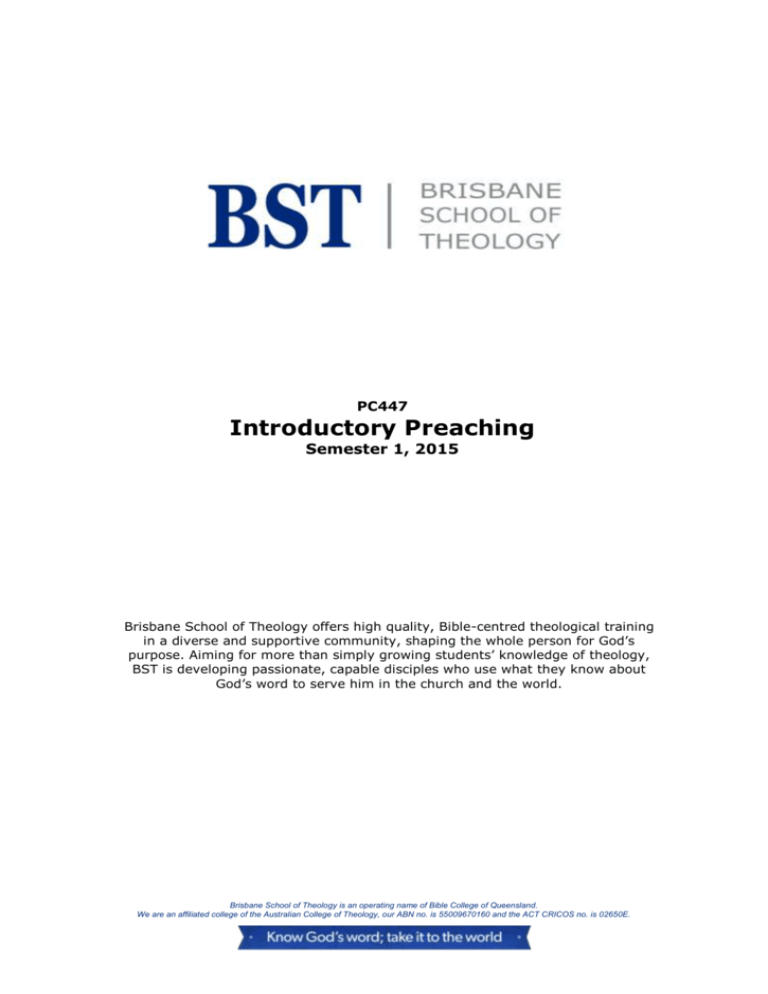
PC447 Introductory Preaching Semester 1, 2015 Brisbane School of Theology offers high quality, Bible-centred theological training in a diverse and supportive community, shaping the whole person for God’s purpose. Aiming for more than simply growing students’ knowledge of theology, BST is developing passionate, capable disciples who use what they know about God’s word to serve him in the church and the world. Brisbane School of Theology is an operating name of Bible College of Queensland. We are an affiliated college of the Australian College of Theology, our ABN no. is 55009670160 and the ACT CRICOS no. is 02650E. INFORMATION ABOUT THIS UNIT Description Preaching is a most remarkable activity. It is where humble human beings become the mouthpiece of God, communicating his word, through the power of the Spirit. That God can and does use people like us in the proclamation of his gospel and extension of his kingdom is an enormous privilege that carries an enormous responsibility. Being the communicators of God’s word means that we will strive, that we will labour, that we will make every effort to diligently study, wrestle with, understand, explain and apply God’s word. That’s what this course is all about- teaching you how to prepare and deliver Bible talks- whether in a church congregational setting, Youth group, Sunday school class, home group, or wherever. I look forward to watching each of you develop as preachers of God’s word over the 4 months of the course Teaching staff Lecturer Additional information Assessment Summary Rev. Andrew Prince BVSc BTh DipMin MAMin PhD (cand) Phone Ph: (07) 3870 8355 Email aprince@bst.qld.edu.au Credit points 4 Co/pre-requisites N/A No. of teaching weeks 13 Item Sermon intro + 1st point Sermon evaluations Short essay Sermon + critique (in class) Sermon + critique Details/Due Date Weighting 500 words Due: 17th March 1,000 words Due: 10th April 500 words Due: 28th April 2,000 words Due: 27th May/ 3rd June 2,000 words Due: 16th June 10% 20% 20% 20% 30% 2 STUDENT LEARNING OUTCOMES AND UNIT CONTENT Learning Outcomes On completion of this unit, students will: 1. Be introduced to theological and pastoral issues in preaching; 2. Be able to understand and acquire basic techniques required for preaching; 3. Be given the opportunity to practice preaching and develop skills in its critique and training, sufficient to begin a preaching ministry. Content Section A: An Introduction to Preaching 1. Preaching as the ministry of the Word; preaching and teaching; preaching and liturgy. 2. The aims, forms and context of preaching; consideration of classical models. 3. Preaching and the preacher; the person of the preacher; the relationship between preaching and personal spirituality. 4. Biblical Theology and its impact on the practice of preaching. Section B: Preaching in Practice 5. An introduction to basic principles in exposition. 6. The components of a sermon, including introductions and conclusions, outlining, illustrations, applications, transitions, climaxes. 7. Methods and techniques of public speaking; contemporary methods in preaching. Section C: Field Work 8. The preparation and delivery of a talk or portions of a sermon in class for critique. Where possible video recording is to be used to assist in the critique. This should be done early in the conduct of the unit. 9. (a) The preparation and delivery of at least two sermons preferably in a church or chapel context. (b) At least one should be expository. The other may be from a different text type or on a topic or given in an occasional or evangelistic context. (c) Full texts or notes are to be submitted to the supervisor, preferably before each sermon is preached. In each case comments are to be obtained from at least one regular preacher present and at least two congregational members. (d) The student is to write a 500 word critique of each sermon and/or to reflect upon the sermon with a supervisor and others, where appropriate. NOTES 1. Where a student has regular preaching engagements outside the conduct of this unit the College many consider it appropriate for the candidate to prepare three or four sermons for critique. 2. Students must be capable of preaching a reasonable sermon before being granted a pass in the unit. If the lecturer believes it is necessary, a student may be required to undertake a program of voice production, public speaking, or additional preaching assignments before satisfactory completion of this unit is approved. 3. Sections A, B and C will be weighted 20%, 20% and 60% respectively in terms of time spent. 3 UNIT TIMETABLE Week 1 Date Feb 18 Topic Giving a Bible talk Pre-reading Watch “Giving the Talk” by J. Chapman 2 Feb 25 A theology of preaching Models of Preaching Chapman, ch. 1-2; Cook, ch.1 3 Mar 4 Sermon introductions, conclusions, illustrations and application; moving from text to message Assessment due yesterday, 5:00pm: Preaching Pyramid Chapman, ch. 3-4 Cook, ch.5 4 Mar 11 History of Christian Preaching Chapman ch. 5-6 Cook, ch.4 5 Mar 18 Student Preaching in class (8-10 min sermons) Assessment due yesterday, 5:00pm: Sermon script Chapman ch. 7-8 Mission exposure week (21-29 March) 6 Apr 1 Preaching different genres (1): Parables; Old Testament Narrative; Gospels; Wisdom Chapman ch. 9-10 Easter, study week and holiday week (3-17 April) Assessment due 10th April, 5:00pm: sermon evaluations 7 Apr 22 Preaching different genres (2): Apocalyptic/ Law/ NT narrative (Acts)/ Epistles/ Prophecy Chapman ch. 11-12 Cook, ch.6-8 8 Apr 29 Biblical Theology and Preaching (1) Assessment due yesterday, 5:00pm: Short essay Goldsworthy, ch. 1-3 9 May 6 Biblical Theology and Preaching (2) Goldsworthy, ch. 4,9 10 May 13 Preaching and the preacher: The person of the preacher; preacher’s spirituality; prayer and preparation. Chapman ch. 13-14 Cook, ch.2-3 Review: Preparing and preaching a sermon 11 May 20 Preparing talks for different occasions: Weddings & funerals; children’s talks; sensitive issues; evangelistic Cook, ch.10-13 12 May 27 Cook, ch.14 13 Jun 3 Student Preaching in class: sermon delivery and critique Assessment due today or next week (preached sermon) Student Preaching in class: sermon delivery and critique 15 Exam week Cook, ch.15 Assessment due 16th June, 5pm: sermon + critique 4 ASSESSMENT OUTLINE FOR PC447 This applies to students who are enrolled at Bachelor level. Assessment 1 Item Details/ Due Date Sermon intro + 1st point, 500 words Preparation and delivery of part of a talk [Intro + 1st point] (5-8 minutes) *Preaching Pyramid and sermon outline due: Tues 3rd Mar, 5pm *Preaching Pyramid, Sermon script due date: Tues 17th March, 2015, 5pm. *Preached sermon: Wed 18th March, 2015, 5pm. 1. Students will be allocated a short passage 2. Students will prepare and submit a Preaching Pyramid on the passage, including a structure for a talk on the passage. 3. Students will deliver the introduction and first part of the talk (5-8 mins) Due: Tuesday, 17th March, 5.00 pm Weighting Assessment 2 Item Details/ Due Date 10% Sermon evaluations, 1,000 words Reflection on a classic sermon (500 words) and a reflection on a contemporary sermon (500 words). Sermons for analytical reflection (up on Moodle): 1. George Muller, “Behold What Manner of Love” 1 John 3:1-3 http://www.newsforchristians.com/clser1/muller_0 01.html 2. Louie Giglio, “I saw the Lord” (Isaiah 6) http://www.youtube.com/watch?v=FYYC7b_RdC8 The reflection for each sermon should answer the following questions i) What was the sermon about? ii) What were the strengths and weaknesses of the sermon? iii) To what extent did the preacher explain the biblical text? iv) What impact did the sermon have on you? Due: Friday, 10th April, 5.00 pm Weighting 20% 5 Assessment 3 Item Short essay, 500 words Details/ Due Date Choose ONE type of biblical genre (law, narrative, prophecy, wisdom, apocalyptic, gospel, epistle). Describe the main features of the genre and how you would preach this genre. Due: Tuesday, 28th April, 5:00 pm Weighting 20% Assessment 4 Item Details/ Due Date Sermon delivered in class, 1500 words [20 minutes] Sermon critique, 500 words Students are to deliver a 20 minute sermon in class. This can be on any passage of Scripture you choose, but it must be an expository sermon. By 5pm the day before the sermon is preached please submit via Moodle: i) A completed Preaching Pyramid ii) A full text of the sermon notes Within 1 week of the sermon being delivered please submit via Moodle: iii) A 500 word critique of your sermon. Due: Tuesday 26th May/ 2nd June, 5 pm (scripts) Deliver sermon in class: 27th May/ 3rd June Weighting Assessment 5 Item Details/ Due Date 20% Sermon delivered in another context, 1500 words [20 minutes] Sermon critique, 500 words Students are to deliver a 20 minute sermon in a context outside of class (e.g. church, youth group, evangelistic event etc). This can be on any passage of Scripture you choose. For the sermon please submit within two weeks of you having preached it: i) ii) iii) iv) A completed Preaching Pyramid A full text of the sermon notes 3 sermon feedback forms filled out by different people who heard the sermon is to be submitted. In each case comments are to be obtained from at least one regular preacher present and at least two congregational members. A 500 word critique of your sermon. Due: Tuesday 15th June, 5pm Weighting:30% 6 LECTURE ATTENDANCE Please note the ACT policy (see also BST Student Handbook) on lecture attendance in the Undergraduate Handbook and the Graduate and Postgraduate Handbook. You are required to attend at least 80% of lectures. This means you can miss a maximum of two lectures. If you know that you will not be at a lecture, please phone or email the lecturer beforehand. If you miss more than two lectures, your enrolment for this unit may be ended. HOW TO STUDY THIS UNIT You should allocate approximately 7 hours outside of class each week to this unit. LATE SUBMISSION OF WORK Please note the ACT Late Penalties Policy (including extensions; see also BST Student Handbook). Failure to submit any individual assignment on time may result in either a late penalty or a zero mark for the assignment. PASSING THIS UNIT To pass this unit you must complete and submit each assessment item. You must also attain an overall percentage mark of 50% or more. PLAGIARISM Please note the ACT Academic Misconduct Policy (see also BST student handbook) on plagiarism. This is a serious issue and it is your responsibility both to understand what plagiarism includes and to avoid it completely. If you are found to have plagiarised, there will be serious consequences as specified in the BST student handbook. Penalties for plagiarism are as follows (from ACT Academic Misconduct Policy). First offence: Students will be subject to academic counselling, with the maximum penalty being to fail the item with no marks awarded. Where deemed appropriate, the minimum penalty available will be that students may be granted an opportunity to resubmit the assessment with a maximum of 50% for the assessment. Second offence: Fail unit, with no remedial opportunity. Third or major offence: Exclusion from any award of the ACT, or exclusion from the award for up to two years, or other outcome appropriate to the case but with an impact less serious than exclusion. In the case of severe plagiarism and/or cheating, a student may be subject to a separate disciplinary process approved by the ACT Academic Board. Colleges are required to immediately report to the ACT Director of Academic Services all offences of wilful academic misconduct, for recording on TAMS. 7 READING MATERIALS * Books marked with an asterisk are on the Frozen Shelf in the library. Prescribed texts * Cook, D., ed. How to Speak at Special Events. Croydon: SMBC Press, 2007. * Chapman, J. Setting Hearts on Fire. Kingsford: Matthias Media, 1999. Other recommended texts * Goldsworthy, G. Preaching the Whole Bible as Christian Scripture: The Application of Biblical Theology to Expository Preaching. Grand Rapids: Eerdmans, 2000. * Millar, G. and P. Campbell. Saving Eutychus: How to Preach God’s Word and Keep People Awake. Kingsford; Matthias Media, 2013. * Robinson, H. Biblical Preaching: The Development and Delivery of Expository Messages. 2nd ed. Grand Rapids: Baker, 2001. 8 GRADUATE OUTCOMES Attribute Emphases of Unit Strong 1) Passionate discipleship 2) Sound knowledge of Bible √ √ √ 6) Commitment to team ministry 8) Commitment to lifelong learning The unit considers the key themes of Christian teaching and life as they are found in the Pentateuch and Former Prophets. It also traces God’s plan of redemption which culminates in Jesus Christ. The unit is foundational for understanding the Scriptures correctly. The major themes of biblical theology will be studied. Students will gain an overall understanding of the theme of the Bible as well as a historical framework in which to interpret the Bible. Careful study of the Scriptures promotes humility and faithfulness. √ 5) Commitment to mission 7) Basic ministry skills Light √ 3) Humility and faithfulness 4) Communicating the Gospel Moderate Comment √ √ √ An understanding of the biblical and historical context of the gospel is essential for effective communication of the gospel. The unit provides the historical context for the gospel message. One of the key themes of the unit is mission, especially as the outworking and purpose of God’s covenants. Students will appreciate that mission is not a secondary theme of Scripture, but lies at its core. While the unit does not focus specifically on the development of team work, class discussion will provide opportunity for students to learn within a communal setting. This unit involves the skills of listening, discussing, and research and writing. Much time will be spent in interpreting and applying Scripture, which is a basic ministry skill. The unit will highlight the immense scope of the Scriptures and the need for ongoing learning and growth. Learning will whet the appetite to keep learning. 9 GRADUATE ATTRIBUTES 1) They will be passionate disciples of Jesus Christ. Graduates will maintain a vibrant relationship with God, be passionate about following Jesus and walk by the Spirit in every area of life. They will seek to love God above all else and others as themselves in attitudes, words and deeds. They will be imitators of Jesus, obey His Word, deny themselves, take up their cross and follow Jesus wherever He may lead (Mark 8:34). 2) They will have a sound knowledge of the Bible. Graduates will have an in-depth and comprehensive knowledge of the Bible. They will be committed to the infallibility and authority of the Bible as God’s Word in everything pertaining to salvation and the Christian life (2 Tim 3:14-17). They will do their best to be good teachers of the Bible who correctly explain the word of truth (2 Tim 2:15). 3) They will have genuine humility and demonstrate faithfulness in life and ministry. Graduates will live lives of holiness, humility and faithfulness. They will be willing to acknowledge their shortcomings and mistakes, and be open to receive constructive criticism and advice. They will do nothing out of selfish ambition, but in humility will consider others better than themselves (Phil 2:3). They will be prepared to suffer for the sake of Christ, knowing that “we must go through many hardships to enter the kingdom of God” (Acts 14:22). 4) They will be effective communicators of the Gospel. Graduates will know the Gospel and will be eager and able to communicate the Gospel, especially in word, but also through writing and other media, in ways that are culturally sensitive and intelligible to others. They will have compassionate hearts, listening empathetically to people in their particular contexts. They will be ready to preach the Word at any time with patience and care (2 Tim 4:2), trying to persuade people to believe the Gospel and to become followers of Jesus (2 Cor 5:11). 5) They will have a great commitment to God’s mission. Graduates will be aware of the needs and opportunities of local and global mission. They will endeavour to see the coming of God’s kingdom in every sphere of life, strive for justice for the poor and work towards community transformation. They will be passionately committed to and will be active in working towards the fulfilment of the Great Commission, to make disciples of all nations (Matt 28:18-20). 6) They will be committed to team ministry and servant leadership. Graduates will be committed to the local church as the family of God and as their context for ministry and base for mission (Heb 10:24-25). They will work enthusiastically and cooperatively with others in ministry teams. They will be open to Christians across various evangelical denominations and churches (Luke 9:49-50). As leaders they will be disciple-makers, following the Lord Jesus in serving, leading by example, and training and mentoring other leaders (Mark 10:43-45). 7) They will be competent in basic ministry skills. Graduates will be competent in basic ministry skills, including preaching, teaching, leading and caring for people. They will use their gifts to implement constructive change in the church and community (1 Tim 4:616). They will be culturally attuned and flexible in dealing with a range of issues (1 Cor 9:19-23). They will embrace accountability and maintain professional standards in various contexts. They will be “salt and light” in the world (Matt 5:13-14) and be able to “prepare God’s people for works of service, so that the body of Christ may be built up” (Eph 4:12). 8) They will be committed to lifelong learning and personal growth. Graduates will be proactive in expanding their knowledge and abilities. They will be open to new challenges, be willing to face unfamiliar problems and accept wider responsibilities. They will continue to grow in faith, knowledge and maturity, “forgetting what is behind and pressing … toward the goal for the prize of the upward call of God in Christ Jesus” (Phil 3:13-14). 10
